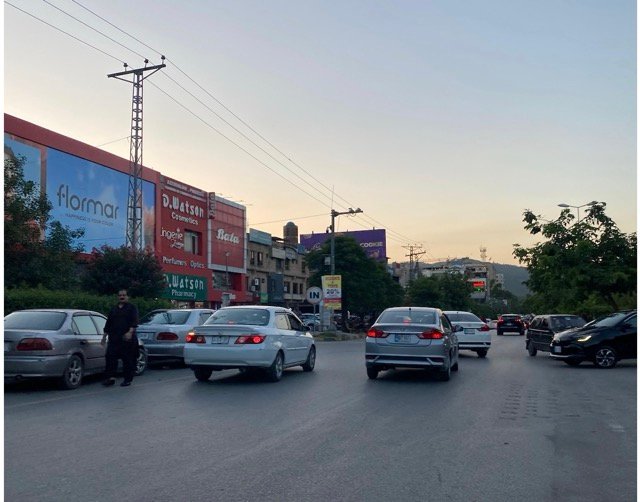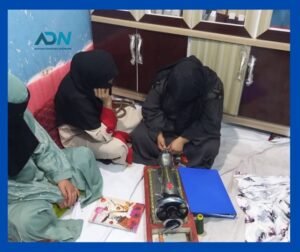Pakistan State kneels before extremist group TLP for third time in one decade

Islamabad, the capital of Pakistan, October 2025. Photo: @Private for ADN.
By Fatima Chaudhary
Pakistan became helpless before the Tehreek-i-Labbaik Pakistan (TLP) three times in the past decade as the extremist organisation brought major cities to a standstill through protests, marches and sieges. The recent protests by thousands of TLP workers over the Gaza issue led to traffic blocks, the suspension of civic and transport services, and the cutting off of the capital city of Islamabad from the rest of the country. Yet, no tangible action was seen from the government.
It is reminiscent of what had happened in 2021 when the TLP had laid siege to Islamabad for ten days, while the Pakistan government and military appeared vulnerable and feeble. The far-right Islamist party wields huge influence in the country.
“TLP is undoubtedly controversial but still it’s more popular than party in government, there were thousands in their protest which the ruling party cannot even gather at their rally,” said Pakistani national Qaasim Iqbal.
In 2017-18, thousands of TLP workers brought the government to its knees over the acquittal of a Christian woman on false charges of blasphemy. They choked the roads to Lahore, while setting rickshaws and cars on fire and causing massive traffic jams. In order to please the protesters, the Islamabad government agreed to put the woman on Exit Control List (ECL) and not to oppose a review petition against her acquittal.
“Protests like these are the reason behind Pakistan’s placement on FATF’s (Financial Action Task Force on Money Laundering) grey-list,” said the then Interior Minister Ahsan Iqbal.
Many people blamed the political leaders of Pakistan for what was happening.
“The absolute paralysis imposed on the country’s capital Islamabad for more than last 48 hours by the state’s own Frankenstein monster, TLP represents failure of the state,” said former Pakistani legislator Afrasiab Khattak.
There is widespread belief that Pakistan’s powerful military created the TLP to use as a pressure group or shape the outcome.
The TLP workers marching toward Islamabad were confronted by the security forces, causing violent clashes. Social media reported smoke-filled streets, constant gunfire, and rising casualties, even as the government struggled to control the situation.
“The law and order crisis in Pakistan is spiralling out of control—violent TLP protests in Islamabad,” said a person named Aliya Shirazi.
Another Pakistani named Khalil Iqbal said the country was under siege due to the imposition of curfew, blocked roads, and internet shutdown.
“Meanwhile, leaders do what they do best- nothing. Pakistan, a country paralysed by its own extremism. Fourteen soldiers dead, 6 critically injured – yet Rawalpindi will call it a “minor setback.” Billions spent, soldiers die, and generals keep counting their gold-plated pensions,” he said.
In 2021, the same TLP had created chaos across the country, demanding the expulsion of France’s Ambassador to Pakistan for the publication of cartoons on the Prophet Muhammad by a French satirical magazine, Charlie Hebdo. The protestors laid siege to Islamabad and the garrison city of Rawalpindi, which caused huge economic losses to the country.
Successive governments’ failure to generate sufficient employment for young people, growing wealth inequality, and the overall shift of Pakistani politics toward right-wing extremism have made the TLP a formidable challenge.
Distinguished Pakistani journalist Fahd Hussain had slammed the government for its weak governance and for remaining silent even when TLP personnel continued to ransack public property, killing policemen and challenging the sovereignty of the state.
“The government waited, and watched, and stayed silent — even the most voluble brigade of spokespersons — in face of this anarchy. In Islamabad, high officials and their political bosses struggled to hide their nervousness under the garb of silence,” he said.
Political activist Amjad Ayub Mirza said Pakistan was facing the consequences of its long-standing policy of nurturing religious extremist groups for political gains.
“For decades, Pakistan has empowered religious outfits like TLP to serve its domestic political goals and to export extremism beyond its borders, first in India and later in Afghanistan. Now, those very elements are turning against the state itself,” he said.
Analysts blamed the appeasement policy adopted by the civil government and the military for political or strategic reasons, which has allowed the TLP to overpower the state of Pakistan.
“Pakistan has moved precariously closer to a point where hardline Islamist groups and parties dominate the agenda, with state agencies losing a crucial battle in the face of Islamist radicalism. Pakistan’s ruling establishment is wholly responsible for this sorry state of affairs as it has allowed the TLP to propagate its radical agenda unchecked, without learning from past mistakes,” said Vinay Kaura, a Non-Resident Scholar at the Middle East Institute.
Fatima Chaudhary is a lecturer at a private university in Pakistan’s Punjab province.
Note: The contents of the article are of sole responsibility of the author. Afghan Diaspora Network will not be responsible for any inaccurate or incorrect statement in the articles.






